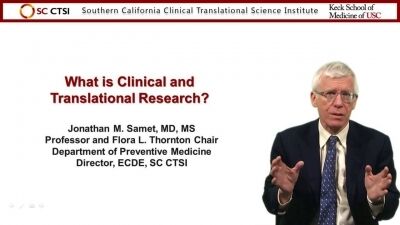CTR is the branch of health research that seeks to bridge the gap between bench researchers who conduct basic science and clinicians seeking to treat people and populations. To speed the pace of CTR, the NIH has galvanized the field through establishment of the Clinical Translational Science Award.
In Part 1 of the video lectures that accompany "Introduction to Clinical and Translational Research, Session 1," a lecturer summarizes the history and rise of CTR in recent years, and introduce its key concepts. He reviews the obstacles that make translational research difficult, and the basic processes and architecture of CTR studies. Emphasis is given to CTR's various goals, including the improved use of bioinformatics and high dimensional data in research, and the development of Precision Medicine, (sometimes known as personalized medicine.)
Part 2 of the video lectures focuses on the importance of forming research questions and hypotheses appropriate to CTR inquiry. The lecturer outlines the types of health phenomena CTR is most concerned with, including disease/health mechanisms and mediators, diagnoses, and interventions. She reviews the nature of CTR research questions, and provides tools to help new investigators construct compelling hypotheses that will contribute to success in research, grant applications and article submissions.

